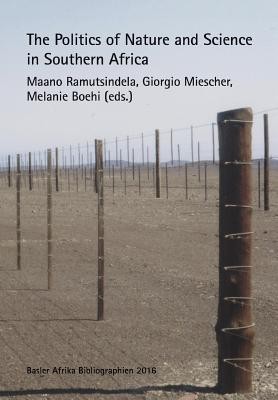
- We will send in 10–14 business days.
- Publisher: Basler Afrika Bibliographien
- Year: 2016
- ISBN-10: 3905758776
- ISBN-13: 9783905758771
- Format: 17 x 24.4 x 1.8 cm, minkšti viršeliai
- Language: English
- SAVE -10% with code: EXTRA
The Politics of Nature and Science in Southern Africa (e-book) (used book) | bookbook.eu
Reviews
Description
This book brings together recent and ongoing empirical studies to examine two relational kinds of politics, namely, the politics of nature, i.e. how nature conservation projects are sites on which power relations play out, and the politics of the scientific study of nature. These are discussed in their historical and present contexts, and at specific sites on which particular human-environment relations are forged or contested. This spatio-temporal juxtaposition is lacking in current research on political ecology while the politics of science appears marginal to critical scholarship on social nature. Specifically, the book examines power relations in nature-related activities, demonstrates conditions under which nature and science are politicised, and also accounts for political interests and struggles over nature in its various forms. The ecological, socio-political and economic dimensions of nature cannot be ignored when dealing with present-day environmental issues. Nature conservation regulations are concerned with the management of flora and fauna as much as with humans. Various chapters in the book pay attention to the ways in which nature, science and politics are interrelated and also co-constitutive of each other. They highlight that power relations are naturalised through science and science-related institutions and projects such as museums, botanical gardens, wetlands, parks and nature reserves.
EXTRA 10 % discount with code: EXTRA
The promotion ends in 21d.09:01:49
The discount code is valid when purchasing from 10 €. Discounts do not stack.
- Publisher: Basler Afrika Bibliographien
- Year: 2016
- ISBN-10: 3905758776
- ISBN-13: 9783905758771
- Format: 17 x 24.4 x 1.8 cm, minkšti viršeliai
- Language: English English
This book brings together recent and ongoing empirical studies to examine two relational kinds of politics, namely, the politics of nature, i.e. how nature conservation projects are sites on which power relations play out, and the politics of the scientific study of nature. These are discussed in their historical and present contexts, and at specific sites on which particular human-environment relations are forged or contested. This spatio-temporal juxtaposition is lacking in current research on political ecology while the politics of science appears marginal to critical scholarship on social nature. Specifically, the book examines power relations in nature-related activities, demonstrates conditions under which nature and science are politicised, and also accounts for political interests and struggles over nature in its various forms. The ecological, socio-political and economic dimensions of nature cannot be ignored when dealing with present-day environmental issues. Nature conservation regulations are concerned with the management of flora and fauna as much as with humans. Various chapters in the book pay attention to the ways in which nature, science and politics are interrelated and also co-constitutive of each other. They highlight that power relations are naturalised through science and science-related institutions and projects such as museums, botanical gardens, wetlands, parks and nature reserves.


Reviews